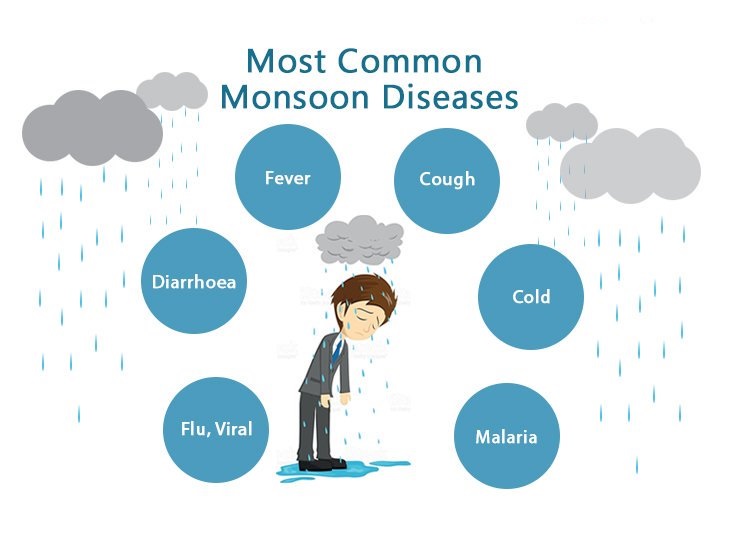Monsoon season has begun, so if you are feeling ill, see your doctor right away so that a proper diagnosis can be made rather than waiting or self-medicating. Stay alert, and healthy, and take advantage of the beautiful weather.
We all breathe a sigh of relief when the monsoons arrive after the sweltering summer heat. Additionally, enjoying such crispy treats in good weather is always fun. However, the monsoon brings many unwelcome visitors like germs, viruses, and moulds, all of which spread illnesses that make us uneasy.
Because of the moisture and stagnant water, the monsoon season increases our susceptibility to a wide range of illnesses. While typhoid, diarrhoea, and jaundice are frequent, there are also additional common illnesses.
Common Diseases in Monsoon Season
Jaundice:
The rainy season is when viral liver infections are most prevalent. Water is a vector for the hepatitis virus to propagate. This infection is really dangerous. Jaundice, which is caused by hepatitis, causes yellow urine and eyes.
Diarrhoea:
Food or water contamination is the leading cause of diarrheal illnesses. Another name for it is food poisoning. Diarrheal diseases are self-limited and only require supportive care, such as salt and water replacements took orally. Intravenous fluids and antibiotics may be necessary for severe diarrhoea. Resting and switching to a clear liquid diet is helpful.
Typhoid:
A highly contagious illness that is primarily spread by tainted food and water. Typhoid may be diagnosed if there is a persistent fever, headache, diarrhoea, and abdominal pain along with a rash. The patient should be kept apart from family members.
Common Cold, Cough, and Viral Fever:
The common cold, cough, and viral fever are all caused by viruses that like damp environments to grow. Your likelihood of contracting a cold is also increased by prolonged contact to humid air from air conditioners. It exhibits signs including fever, coughing, a cold, runny nose, and excruciating physical ache. Paracetamol and antihistamines are needed to treat the symptoms associated with these infections. Warm liquids can be helpful.
Hepatitis A
It is a virus that is spread by tainted food and water. A rise in body temperature, loss of appetite, body aches, joint discomfort, nausea, and vomiting are among the symptoms. The skin, nails, and eyes all have a yellowish tint.
Gastroenteritis
It is an illness of the intestine caused by bacteria and viruses that are spread by contaminated water. This illness is typically minor and self-limiting, although it can occasionally become life-threatening. If you experience symptoms, seek medical attention right once.
Malaria
It is brought on by breeding mosquitoes. Shivering and high fever attacks are frequent. The onset of fever is periodic. Therefore, if you experience any malarial symptoms, do not ignore them and seek medical attention right once. Close windows and doors early in the morning and late at night to keep insects out.
Dengue & Chikungunya
Dengue and chikungunya are serious health risks. Although chikungunya rarely has hemorrhagic signs, both infections have a similar set of symptoms. Chikungunya is characterised by flu-like symptoms, a sudden rise in temperature, and excruciating joint pain. Swollen hands or feet as well as a skin rash are additional symptoms.
Headache, chills, and low back pain are the symptoms of dengue. When the condition first manifests, the legs and joints experience excruciating pain. The patient may also experience fever, headache, bodily pain, and rashes as their temperature rise rapidly. A low platelet count may be diagnosed. Serious cases require quick hospitalisation and aggressive care. There is currently no anti-infective medication or vaccination available. The best course of action is to keep mosquitoes out of your house.
Skin Problems
Skin issues: Skin infections are expected to become more common during the rainy season. Wet clothing can exacerbate breakouts and bacterial infections. Infections with fungi are frequent in places like the groyne, between the toes, and in the armpits. The infection might potentially get so bad that skin surgery is necessary. Moisturizing the skin after cleansing is crucial, particularly if you spend a lot of time in an air-conditioned setting.
Prevention
Taking appropriate precautions is the best way to avoid monsoon-related ailments. Follow these simple prevention tips to enjoy the monsoon season to the fullest.
- Wash hands before every meal. Carrying hand sanitiser can save you from picking germ-related illnesses such as cold and cough.
- Avoid eating outside. Stick to freshly prepared homemade food.
- Drink only clean / boiled water or use water purifiers.
- Wear clothing that protects you from mosquito bites.
- Taking a warm water bath as soon as you get home is the best way to increase your body’s immunity.
- Protect yourself from mosquitoes by using nets, repellents, etc.
- Discourage children from playing in dirty water.
- Cover your mouth with a handkerchief while coughing or sneezing.
- Eat plenty of fresh fruits and green leafy vegetables.
- Swim only in the pools that are cleaned properly as these carry a good source of infection.
- Ensure that your neighbourhood is kept as clean as possible.
- Prevent mosquito breeding by removing junk, covering open overhead tanks, etc.
Book an appointment with the experts at the Smart Hospital, Ghaziabad.

